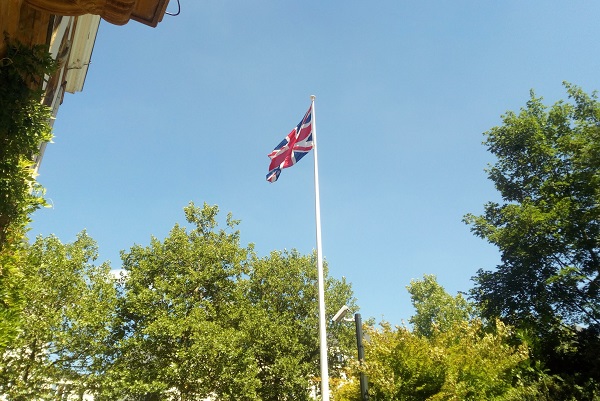 Union Jack outside the British Embassy in Luxembourg, 2017;
Credit: Jazmin Campbell
Union Jack outside the British Embassy in Luxembourg, 2017;
Credit: Jazmin Campbell
On Monday 13 June 2022, the United Kingdom (UK) published plans to scrap parts of the Protocol on Ireland and Northern Ireland, which forms part of the EU-UK (Brexit) Withdrawal Agreement.
The protocol in question, widely known as the Northern Ireland Protocol, has been a source of tension since it came into effect on 1 January 2021. The Protocol provides for special trading arrangements for Northern Ireland, effectively keeping it in the European Union (EU) single market and customs union and thus avoiding a hard border on the island of Ireland and upholding the 1998 Belfast (Good Friday) Agreement.
However, the Protocol has proven unpopular among Unionist parties in Northern Ireland who argue that it undermines their place in the UK. In fact, following the recent local elections in Northern Ireland, the Democratic Unionist Party (DUP) lost their position as the largest party, being overtaken in the polls by Sinn Fein, the leading Nationalist party. Since then, the DUP have refused to join the Northern Ireland Executive, therefore stalling an important political process and institution that was set up in December 1999 to provide for devolved government in Northern Ireland.
On 13 June, the UK Government introduced legislation aimed at scrapping parts of the deal and creating red and green lanes for goods imported from mainland Britain into Northern Ireland. While Liz Truss, the UK's Secretary of State for Foreign, Commonwealth and Development Affairs, stated that the Northern Ireland Protocol Bill would uphold the Good Friday Agreement and support political stability in Northern Ireland, other political commentators have argued that it breaks international law.
On Wednesday 15 June 2022, the European Commission launched infringement proceedings against the UK for non-compliance with significant parts of the Northern Ireland Protocol. European Commission Vice-President, Maroš Šefčovič, said: "Trust is built by adhering to international obligations. Acting unilaterally is not constructive. Violating international agreements is not acceptable. The UK is not respecting the Protocol".
In response, a UK government spokesperson said: "It is disappointing that the EU has chosen to relaunch legal proceedings relating to the grace periods currently in place, which are vital to stop the problems caused by the Protocol from getting worse".
In this context, Chronicle.lu invited the British Ambassador to Luxembourg to comment on the current situation.
The British Embassy in Luxembourg replied: "The UK government's overriding priority is to preserve peace and stability in Northern Ireland; which the current situation does not allow. It has always been the UK's preference to resolve the current issues through talks. Unfortunately, the EU has so far not been willing to change the Protocol, which is necessary to deliver the solutions needed for Northern Ireland. It is important to note that the UK government's proposal provides safeguards so that there will be no damage to the EU Single Market. The UK government has engaged in negotiations in good faith and will continue to do so, but the EU has been clear it will not change the Protocol". The statement continued: "The Foreign Secretary and Lord Frost met with VP Šefčovič 26 times - more than with any other international partner. As mentioned throughout this process, the UK remains open to negotiations. Nonetheless, we cannot forget about the threat to peace, prosperity and political stability in Northern Ireland. After months of negotiations, the UK Government is asking the Commission to go back to Member States for a mandate to discuss changes to the protocol- but it can't wait to fix the issues facing the people of Northern Ireland".
Regarding how the Northern Ireland Executive impasse could be resolved, the Embassy stated: "The Protocol as it stands right now is causing significant problems for businesses and citizens and stands in the way of a functioning Executive, and is undermining the Belfast (Good Friday) Agreement. The UK government cannot allow this situation to drift, it is thus urgent and necessary that we act. Prime Minister Johnson and his government have been clear with all parties in NI that they need to get Executive back up and running to deliver for people in NI. While there is no guaranteed way to restore the Executive, this Bill would deal with the principal barrier presently standing in its way. Without it, it is highly unlikely that we will see power-sharing restored. The UK government intends to engage widely with Northern Ireland stakeholders on the use of the powers in the Bill, including with the Northern Ireland Executive; however, one of the key obstacles currently is that there is no Executive in place, due to the issues caused by the Protocol".








